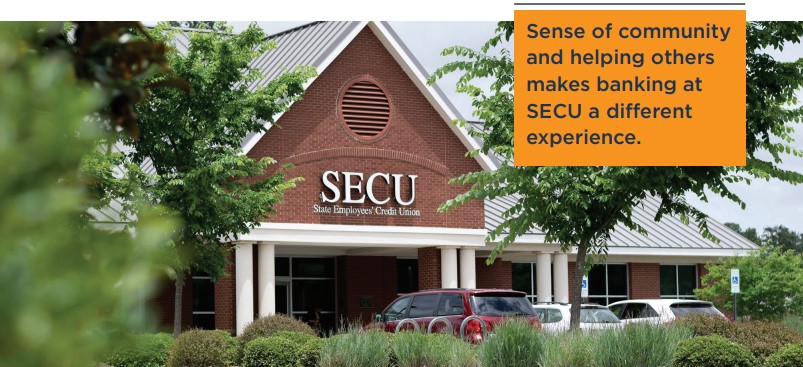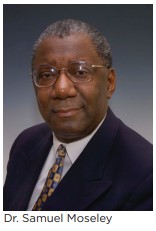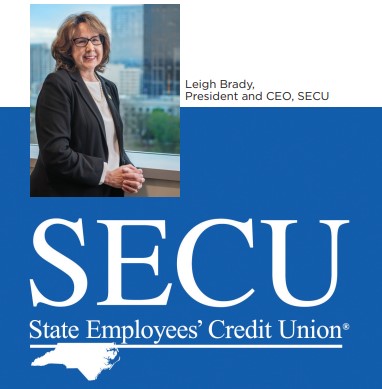PEOPLE OVER PROFIT: How SECU Puts Members First
Spring 2024 Living Power Magazine

As a young professor at NC A&T State University, Dr. Samuel Moseley received an opportunity to travel to a conference that would help him advance his career in academia. But Moseley needed funding to make the trip possible. A colleague suggested he visit the North Carolina State Employees’ Credit Union (SECU) for help.

Moseley visited a branch to apply, and he was approved for a loan that would make it possible for him to attend the conference. “Being able to go to that conference, I was able to be more involved in my field and grow professionally,” Moseley says. “It allowed me to go on to be in a position where I could help others coming up behind me and help our students make an impact on the world.”
That kind of life-changing support happens every day at SECU. Be it a mortgage for a first-time home buyer, an auto loan, or even retirement planning advice, SECU works relentlessly to help its members meet their personal and financial goals.
Founded more than 85 years ago in 1937, SECU started with just 17 members and $437 in deposits. Since then, SECU has grown to the second-largest credit union in the United States with nearly 2.8 million members and more than $54 billion in assets. And SECU’s model of a not-for-profit, member-owned financial cooperative means that unlike most for-profit traditional banks, the interests of the members come first.
Bank Mission
SECU’s mission is “to be the trusted provider of financial services to every eligible member and to enhance the value of their lives and financial wellbeing while maintaining our fiscal strength.”
“Everything that we do is in the best interest of the member and our mission,” says Leigh Brady, president and CEO, SECU. “And that ultimately boils down to the fact that we want to help our members keep their money where it belongs—in their pocket.”
Community Focus
While SECU remains focused on its members, the SECU Foundation is dedicated to supporting local communities in North Carolina. Through the SECU Foundation, the organization promotes local and community development throughout the state by funding high-impact projects in the areas of housing, education, healthcare, and human services. Since 2004, the SECU Foundation has been funded through SECU members’ $1 per month checking account maintenance fee, which is allocated to the foundation.
And those dollars add up: Over the past 20 years, the foundation has awarded more than $258 million in scholarships, grants, and loans. That money funds initiatives such as teacher housing, hospice homes, and a robust scholarship program that supports students at North Carolina community colleges and universities in the UNC System.
“No other financial institution I know of is doing that kind of thing, going into the communities, building apartment buildings for teachers, contributing to an institution that assists persons with addiction in Greensboro,” Sibert says. “These are amazing things, and that’s where members are helping members.”
Both Sibert and Moseley say that sense of community and helping others makes banking at SECU a different experience—one that sees each individual member as valued and important, no matter how much money they have in their account.

SECU achieves that goal in a number of ways, from lower fees and competitive loan rates to a range of deposit accounts, along with lending, insurance, and investment services. Brady says financial education plays a major role in how SECU positions even those with shakier financial footing for success.
“We offer services such as financial counseling with loans,” she says. “And if our members get in dire straits, we work with them on things such as loan extensions, and we have a wonderful mortgage assistance program if they are having problems making payments.”
The SECU mortgage assistance program may include options such as payment amount modifications,
temporary payment deferment, and refinancing for members facing hardships that impact their ability to pay. And in addition, SECU assists members with services such as debt counseling, retirement planning, and even budgeting with tools like the Spending Plan Guideline, which helps members by breaking down their monthly expenses and suggesting ways to best allocate funds.
Dr. James Sibert has seen how those services can make a difference in the lives of members. The retired NC A&T administrator has served for many years on his local SECU branch Advisory Board, providing feedback on behalf of his fellow members. All 275 SECU branches have Advisory Boards with up to 12 member volunteers. “The credit union is a financial institution that is truly helping its members,” Sibert says.

“When you walk into the credit union, you get friendly people meeting you—people who desire to assist you in any way possible,” Sibert says. “They’re very sincere in helping you, and that member service means a lot to me—it really makes you feel good.”
More than 40 years after that first loan, Moseley says the role SECU has played in his and his family’s lives can’t be overstated. And he remains grateful for SECU’s support to this day.
“Whenever I’ve had a need, I’ve gone to the credit union,” he says. “I financed cars, I financed my home. The credit union has been good to my children, and it has always been good to me. So I’m very thankful for the credit union and how it treats members.”


